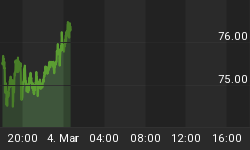I saw a story on MarketWatch on Monday which declared that the "Treasurys most sensitive to rising interest rates" had been ditched by investors while those investors instead were "gobbling up longer-term securities," causing the curve to reach its flattest level since 2009. I thought that was interesting, since an inverted yield curve is a valuable indicator of potential recession.[1]
However, the MarketWatch article concerns the slope between the 5-year and 30-year Treasuries (see chart, source Bloomberg).

Ordinarily, I watch the 2y-10y spread rather than the 5y-30y spread, because the 2-year rate is more responsive to near-term adjustments in Fed policy and the 10y note is more liquid than the 30y bond. And that spread hasn't done anything of particular note (see chart, source Bloomberg).

Obviously, the charts look similar, and as you can tell in both cases a flat or inverted curve is a precursor to recession. But I think in this case it may well make sense to look at the 5y-30y spread, as MarketWatch implicitly suggests. The 2-year note, which normally responds rapidly to changes in Fed policy, may not do so as much in this cycle because when the Fed starts to attempt to increase overnight interest rates, it is going to find it difficult to do. The 2-year note, which ordinarily impounds the expected tightening of monetary policy, must now also incorporate the fact that with trillions of dollars in excess reserves, overnight rates cannot be easily increased by the Fed except by increasing interest on excess reserves (IOER). Accordingly, as the Fed continues to tighten policy - first, by decreasing QE3 and then by trying to mop up the excess reserves - short rates themselves may not rise.
That is, people waiting for a curve inversion of 3m bills or 2-year notes to 10-year notes to signal the next recession are going to be late in reacting. The curve cannot invert, at least from 3-month or 2-year Treasuries to longer Treasuries, when the Fed is pinning short rates at zero. But it is possible that the curve could invert from 5-year notes, and I will be paying more attention than usual to that possibility now.
Along with yesterday's article I should have included the following chart (source: Bloomberg).

This is a chart of the Mortgage Bankers' Association Purchase index, and it illustrates that mortgage origination activity for the purpose of purchasing, rather than refinancing, a home has remained quite low ever since the bubble initially burst. This speaks again to my point from that article: the Fed's purchases of MBS did not result in a surge in home-buying activity. There has been plenty of refi business, but the Fed didn't need to buy MBS to cause an uptick in refi activity - they only needed to force interest rates generally lower (I concede that, early on, they were concerned about the MBS basis, but that hasn't been an issue for several years).
But refinancing doesn't increase home prices. New buying activity does, and the data seem to suggest that the marginal price here is being set by the cash buyer, whom the Fed's MBS purchase program did nothing to help.
So the Fed's buying of MBS did not do what it said it would do. In the event, all that it did was to remove risky securities from the market so that investors seeking risk were pushed into riskier securities (read: stocks). Was that its true purpose? Who knows...but what I am sure of is that the Fed didn't do this for the avowed purpose of causing the one result they actually got: reducing negative convexity in the market.
And, in general, I find it disingenuous that the Fed claims credit for one clearly-unintended consequence, while disavowing all of the other unintended consequences, many of which haven't yet been seen since the policy hasn't ended.
[1] However, be clear on this: an inverted yield curve, specifically from the 3-month bill to the 10-year note, is highly predictive of a recession. But the opposite is not true. That is, you do not need an inverted curve to get a recession.
You can follow me @inflation_guy!
Enduring Investments is a registered investment adviser that specializes in solving inflation-related problems. Fill out the contact form at http://www.EnduringInvestments.com/contact and we will send you our latest Quarterly Inflation Outlook. And if you make sure to put your physical mailing address in the "comment" section of the contact form, we will also send you a copy of Michael Ashton's book "Maestro, My Ass!"















